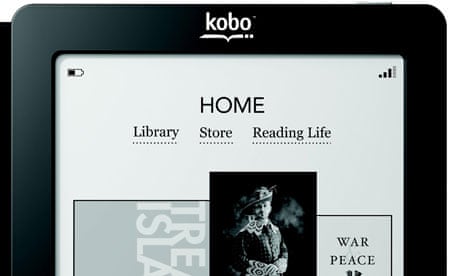High street newsagent and bookseller WH Smith is throwing down the gauntlet to US internet firm Amazon with a rival ebook reader it hopes will be a "Kindle killer".
Its chief executive, Kate Swann, has struck a deal with Canadian firm Kobo to sell its eponymous e-readers, costing from £89.99, and a library of 2.2m books from next week. The retailer will receive a share of the profits on all the Kobo ebooks bought in the UK.
The partnership would give the retailer a presence in a developing market and "complement its traditional books business", Swann said.
Analysts are concerned the increasing popularity of electronic books poses a threat to WH Smith, where book sales are already falling. Swann countered, however, that although high street demand for printed books "continued to be soft" the ebook market was still small, and that devices like the Kobo were aimed at heavy readers and early adopters.
"The reason that we're moving aggressively into ebooks is because we believe if ebooks are ultimately successful that they'll be incremental for us, given [that] our physical books customer base tends to be lighter book readers," she said.
The ebook market was 90% fiction sales, Swann said, adding that the average WH Smith customer bought three books a year, two of which were in the non-fiction or children's sections.
WH Smith reported a 4% increase in profits to £93m in the year to 31 August, despite a 5% decline in like-for-like sales. Book sales fell by 4% but the travel business, based largely in airports and railway stations, made record profits of £57m.
The retailer has suffered steep declines in underlying sales in recent years as Swann, who has been running the business since 2003, pulled out of low-margin areas such as CDs, DVDs and computer games. When she took over, its entertainment departments accounted for a quarter of its £1.3bn sales, but that figure is now less than 5%.
To offset falling sales, Swann has slashed operating costs. Last year she clawed back £14m and plans to extract another £11m over the next two years. She said the savings would come from better energy usage, including more efficient lighting in its 1,100 UK shops, and the introduction of self-service checkouts.
WH Smith has fared better than many high street rivals thanks in part to the fact that the average price of its goods is low. The average customer spend is £5.50 in town centres and £3.50 at travel outlets.
"We don't expect any short-term improvement in customer spending," said Swann. "Consumer spending is clearly challenged at the moment, though we planned for it to be tough and we're well used to operating in tough markets."
Swann has concentrated on expanding the successful travel division, which is now more profitable than its larger high-street arm. She has also cranked up WH Smith's international growth, with more stores planned as far afield as India and Australia in the coming months. It is also experimenting with stores for its Funky Pigeon personalised greetings card business.
Panmure Gordon analyst Philip Dorgan described the results, which saw the shares edge up 2.5p at 530p, as "decent". "WH Smith has withstood the onslaught of online and the supermarkets on its core business and, while ebooks represent a challenge, digital penetration here will be much less than in music," he said. "WH Smith is two businesses. One – the high street – is about managed decline while generating cash. The other – travel – has high barriers to entry and organic growth potential."
